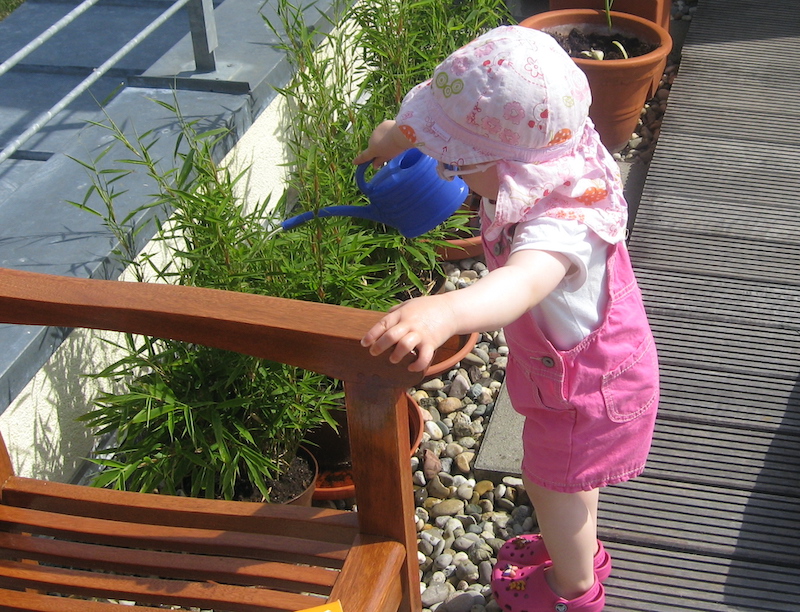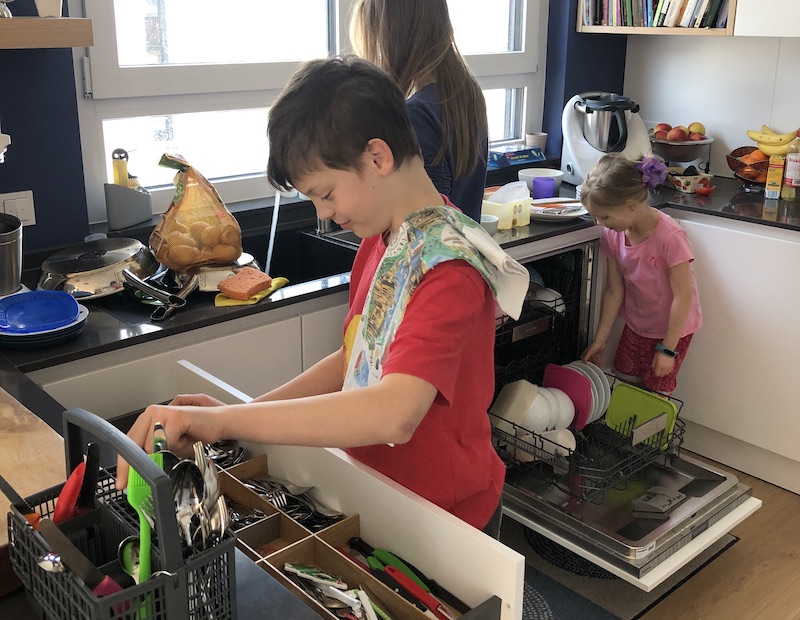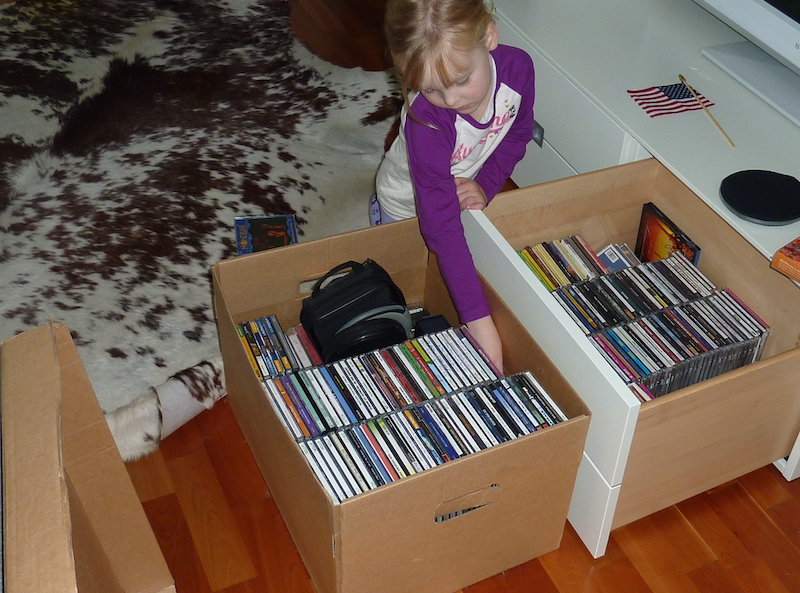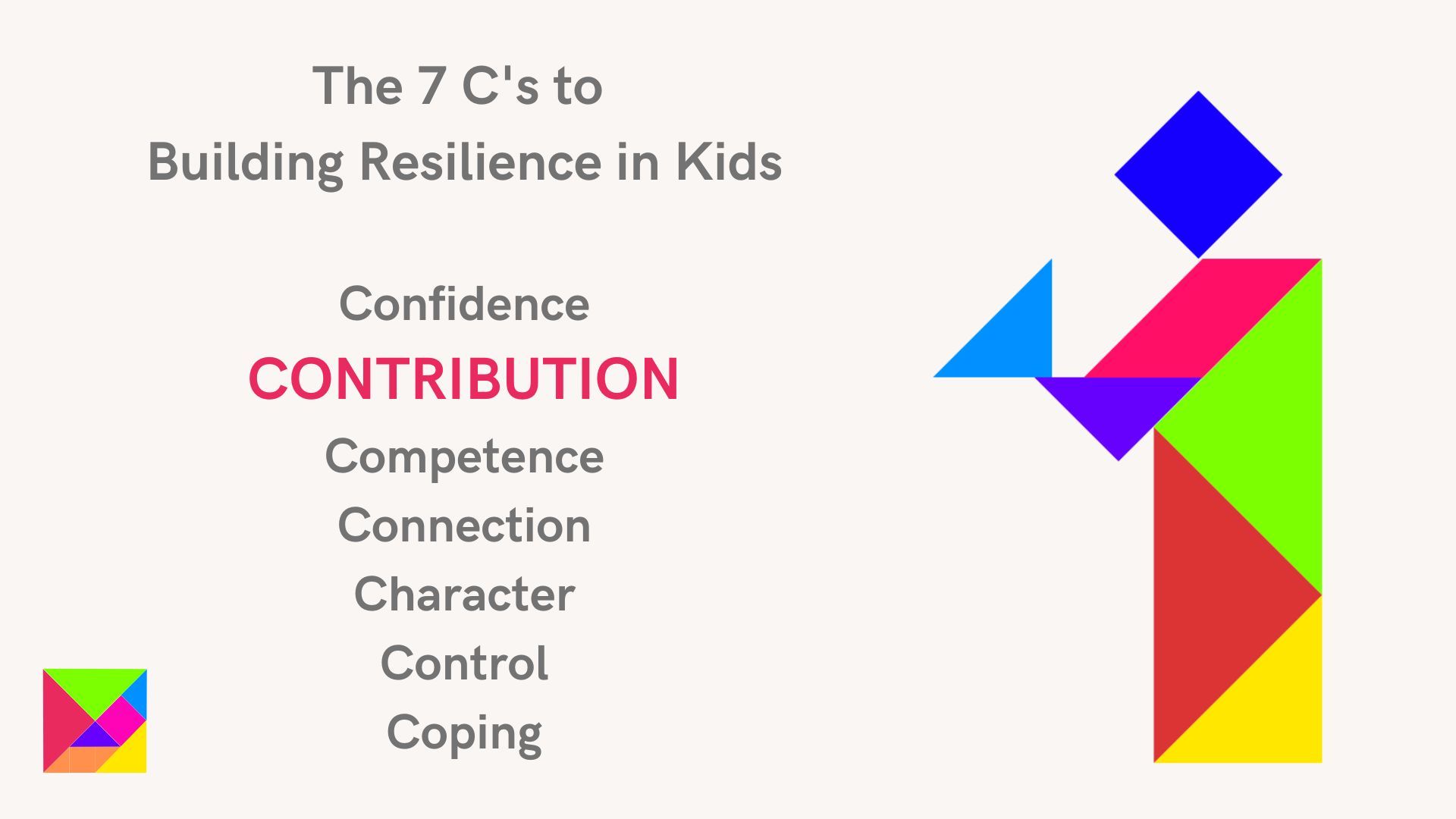
Contribution – what does it mean to you? Money? Time? Volunteering?
You may be surprised to find it in the list of “7 C’s” to help children and teens develop resilience – that seemingly elusive magic ingredient to handling adversity – but contribution builds resilience in kids.
In the 7C model developed by Dr. Ginsburg he identifies seven elements/areas that parents and caregivers can support their children in that combine to build resilience. This series looks at each of these components in depth, making suggestions how parents can support their children – both during a move and in every day life.
They are Confidence, Competence, Contribution, Connection, Character, Control and Coping. This post is about contribution and how we can create opportunities for contribution and learning in our homes & communities and during transitions.
Why Contribution is Important

Did you ever ask your toddler to “help Mommy?” and they gladly obliged, feeling like a big kid and a helper to mom? That was a fun phase but eventually you stopped asking because it became too hard, the pushback was strong and it was easier to just do it yourself?
Truth: you’re not doing yourself or your children any favors by stopping.
Contribution means participating, being part of and adding something – it gives us a warm fuzzy feeling of a job well done and (ultimately) a sense of belonging and ownership. It also improves skills and competence and teaches taking responsibility.
For children – for anyone – it is powerful to know they are helping to make something better, easier, kinder, faster by helping out and being part of something. How they see themselves and their value is increased by knowing the world is a better place with them in it.
How to: Contribution
As parents and caregivers it can sometimes feel tedious and time consuming to teach tasks, to help our children learn. We may feel like we have to re-do after they have completed something, or monitor them, check up, etc.
Sometimes this is the case but ask yourself if it is really necessary for you to follow up? Does the job need re-doing do we need to focus their attention on parts left undone (e.g. making sure the whole garden has sufficient water in the summer)? Or can you just leave it as it is and let them learn from it (like only packing one pair of undies for a week long trip and having to wash them daily)?
Growth has happened when they learn a task and can contribute without your help. Simply copying behaviour is a first step but true learning and growth come from understanding why something is done, how to do it (and improve on it!) and the consequences of what they are doing – and failure is part of that. Learning how to make the best out of the results is too. Case in point: the lemon bars that stuck to the pan because it wasn’t greased well (“I hate doing that part”) were scraped out and layered with fresh blueberries – definitely not the original plan but a creative and workable solution.
Trust yourself and trust your kids.

What kind of contribution?
Chores are classic forms of contribution. In our home everyone is expected to help out. There are a few assigned tasks, others are ad hoc but none are tied to allowance or other privileges.
A side note: We believe contribution is about learning responsibility and being part of a team. While they have opportunities to earn money and learn to manage it (another important skill!), chores are not part of that equation.
What each child is asked to do depends on their age, abilities and available time but even when we had paid household help the kids have always had chores.
In some places we’ve lived this meant setting clear boundaries for our domestic helpers and clear expectations of our children. e.g. they must straighten their rooms but not clean them; they don’t have to do the laundry but they are responsible for getting dirty clothes in the hamper and putting their clean clothes away. With no outside help and as they have gotten older, expectations have changed and adapted.
Some ideas include helping with housekeeping, cleaning up after themselves, putting games & craft supplies away after use, sorting & hanging up laundry, keeping their rooms clean & tidy, taking care of pets, watering the garden, taking out garbage/doing recycling runs, etc. For a more comprehensive list sorted by age, check out this post from Aha! Parenting.
Contribution outside of the home is also important for their development. This can be regularly volunteering at a shelter, taking on a student council or club leadership role, tutoring a younger child, helping friends and neighbors, etc. Look for opportunities for all of your children to make contributions outside of your home.
Contribution during Transition (e.g. moving)
In the midst of a move it may seem counterproductive to involve children, especially younger ones, as it will most likely take longer to do any task BUT it will get make them feel like they are part of the move and give them a sense of control over a very out-of-control time in their life.
Their contribution depends on their age and abilities but most children can be asked to help sort toys & books, to look after pets while you pack, to help wrap & tape valuables, etc. Tasks you can ask even young children to do include matching lids to plastic dishes, putting things in boxes, testing pens & pencils to see if they still work, cleaning toys (think bucket of water – outside), etc.
The trick is to find the balance between including them and pushing them to do too much during a time that is stressful for everyone. Giving them options (“you can do A or B”) is a strategy to get them involved and feel they have a choice in the matter at any age. Please always be sure to let them know how valuable their help is and encourage their participation.
Finding opportunities for them to contribute will ultimately pay off for them and for you.

Resistance? Stick with it
We only have a few years left before our first child flies the nest (the toddler watering the plants in the top photo 🙂 ). Getting them involved in chores and taking responsibility may get easier but also may not. I encourage you to stick with it though. Feel like you’re nagging all the time? Reframe it for yourself. You’re reminding and teaching them and these things take time. The effort you put in is worth it.
(Having said that, to be honest, there are days where it might not be worth the mental strain and internal strife. Take a break, be kind to yourself and start fresh tomorrow. Perhaps havea conversation with your teen about responsibility. Listen to their point of view, share yours and find a solution together. Parenting – especially parenting teens – is hard work.)
Cleaning up after themselves is a life skill and future room mates and partners will thank you for it (and eventually they will, too). Knowing how to do laundry, cook a simple meal and clean a bathroom are skills that are undervalued until you have to do them and don’t know how. These acts of contribution & skill spill over into other areas of life, enhancing competence, character and a sense of connection & belonging.
Additionally, the positive feedback kids and teens get when they pitch in and help out will reinforce their behaviour and go a long way toward feeling valued and motivated to do more. Which will also contribute to building resilience.
Some questions to ask yourself as a parent
Children who feel like they have a valuable contribution to make feel better about themselves. As parents we should create opportunities for them to make regular contributions of their time but we should also model this behaviour ourselves. “Do as I do…” Find ways for you to contribute to your community and bring other adults into your lives that can serve as role models to your children.
I find these questions from the website www.fosteringresilience.com very helpful. They are a place to start reflecting on our own behaviour and how it is influencing our children. An excerpt:
- Do I make clear to my child that I believe he can improve the world?
- Do I create opportunities for each child to contribute in some specific way?
- Do I model generosity with my time and money?
- Do I search for adult (and child) role models who contribute to their communities and the world?
Besides being super important on its own contribution is one of the “7 C’s” of helping children build resilience. Together with the other C’s you can support this in your children. Read more about each of them here: Confidence & Coping; Competence, Connection, Character, Control – coming soon.
don't miss the next Part
Sign up here and get regular mail from me – posts, news, tips, links and jokes for international parents.




